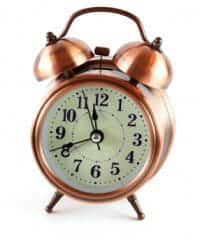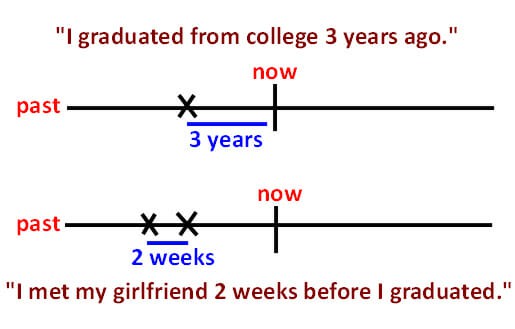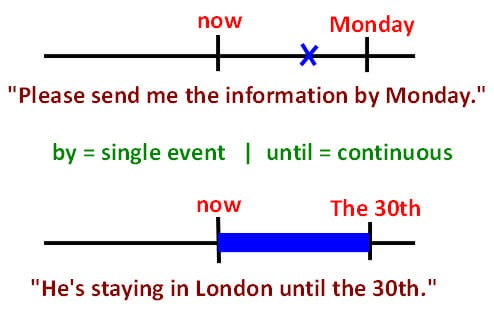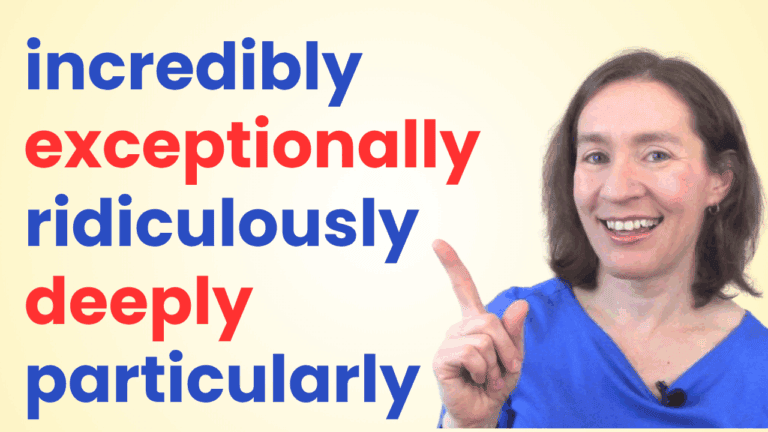Image source: FreeDigitalPhotos.net

after / later
Use after + phrase, and use later alone (at the end of a sentence or phrase).
- I’ll call you later.
I’ll call you after I get home from work. - First he bought a new car. Two weeks later, he bought a new motorcycle.
He bought a new motorcycle two weeks after he bought a car.
- I’ll finish the project later this week.
- We’ll go on vacation later this year.
Never end a sentence with “after.” Instead, you can use “afterwards”
- “Did you go straight home after the baseball game?”
“No, we went out for drinks after.”
“No, we went out for drinks afterwards.“
ago / before
Use ago to talk about past times in reference to the current moment.
Use before to talk about past times in reference to another moment in the past.

by / until
Use by for one specific event that will happen before a certain time in the future. Use until for a continuous event that will continue and then stop at a certain time in the future.
- Please send me the information by Monday.
- He’s staying in London until the 30th.

during / while
Both during and while mean that something happens at the same time as something else.
Use during + noun.
- She cried during the movie.
Use while + subject + verb, or while + gerund.
- She cried while she was watching the movie.
- She cried while watching the movie.
from… to / till / until
We use from + to / till / until to define the beginning and end of a time period.
- The museum is open from 8 AM to 4 PM.
- Jack will be on vacation from tomorrow until next Friday.
- I studied English from 2001 till 2004.
on / in / at
Use in for centuries, decades, years, seasons, and months:
- In the 18th century
- In the 1960s
- In 2001
- In the summer
- In October
- On Friday
- On March 15th.
- On my birthday
- On the weekend
- At 3:30.
- At noon.
- At quarter past four.
- In the morning
- In the afternoon
- In the evening
- At night
past / to
We can use these prepositions with minutes in relation to the hour:
- 3:50 = Ten to four
- 6:15 = Quarter past six
for / since
For is used for a period of time, and since is used to reference a specific point in time.
- I’ve been waiting for three hours.
I’ve been waiting since ten o’clock. - We’ve lived here for four years.
We’ve lived here since 2008. - She’s been working there for six months.
She’s been working there since she graduated from college.
as soon as / as long as
As soon as means “immediately after another event.”
- We’ll call you as soon as we arrive.
(if we arrive at 8:00, we’ll call you at 8:05)
As long as means “for the period of time” or “on the condition that”:
- I stayed awake for as long as I could. (period of time)
- I’ll take the job as long as I have the freedom to work from home a few days a week. (condition)
Learn more about prepositional phrases in English!
Prepositions Quiz: Prepositions of Time
Congratulations - you have completed Prepositions Quiz: Prepositions of Time.
You scored %%SCORE%% out of %%TOTAL%%.
Your performance has been rated as %%RATING%%
Question 1 |
A | until |
B | during |
C | for |
Question 2 |
A | until |
B | in |
C | by |
Question 3 |
A | in |
B | at |
C | on |
Question 4 |
A | for |
B | after |
C | since |
Question 5 |
A | ago |
B | before |
C | back |
Question 6 |
A | before |
B | since |
C | for |
Question 7 |
A | later |
B | since |
C | after |
Question 8 |
A | as long as |
B | during |
C | until |
Question 9 |
A | as long as |
B | during |
C | while |
Question 10 |
A | later |
B | after |
C | past |
Question 11 |
A | on |
B | in |
C | to |
Question 12 |
A | As soon as |
B | As long as |
C | While |
Question 13 |
A | for |
B | during |
C | while |
Question 14 |
A | by |
B | at |
C | to |
Question 15 |
A | in |
B | since |
C | on |
Question 16 |
A | before |
B | ago |
C | after |










